Why Is Tracking Your Google Maps Ranking Important?
Google Maps Ranking: How to Track & Its Importance
So, how do you search for a nearby restaurant for a quick Italian meal? Or how do you search for the nearest car service station?
Yes, of course, you would switch to Google Maps and simply type your query to get the best options in the proximity.
And that’s what a significant number of consumers do!
Google Maps is powering local-intent searches for over 154.4 million users every month.
With that said, the Google Maps platform is important for local businesses. And unless you aren’t ranking for the relevant searches on Google Maps, you are willing to lose significant sales.
So, here we will scrutinize the importance of Google Maps rankings and how to track them.
Then, let’s learn about the factors impacting Google Maps rankings and how to optimize the same.
Top Local Rank Tracking Tools We Recommend
1. SE Ranking Google Rank Checker
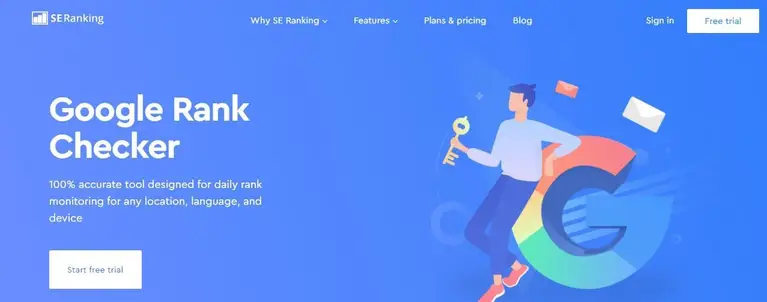
This local rank checker tool allows you to check your Google Maps and mobile search rankings. You can also track your local keyword rankings, find new keywords, and check SEO metrics.
2. WebCEO
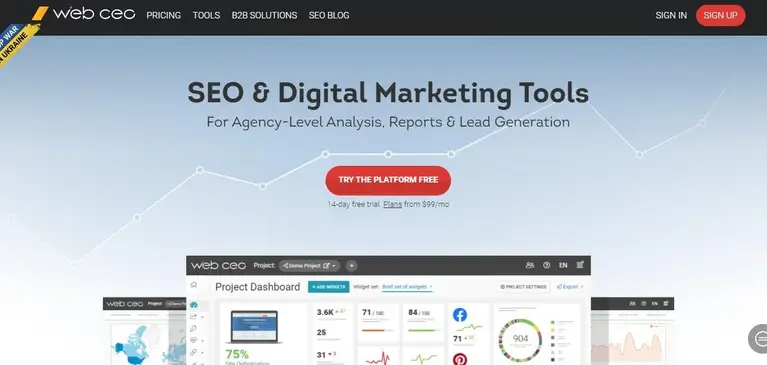
It is a comprehensive tool that tracks local keyword rankings for multiple locations (ZIP, town, and state). You can generate competitor reports for your target keywords and track popular local queries.
3. GeoRanker
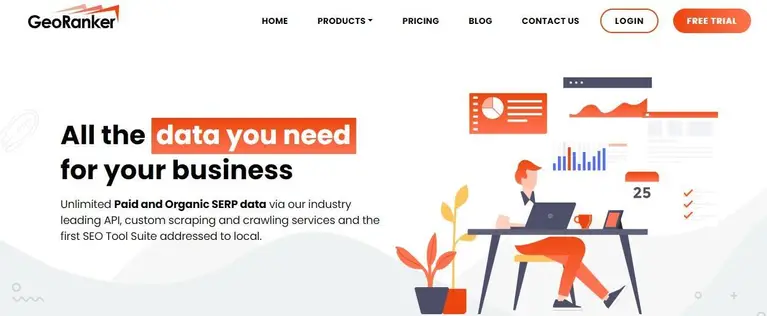
You can use GeoRanker to track your keyword rankings for specific ZIP locations. Further, you can check Google Maps & Bing Maps rankings, citation opportunities, competitor reports, etc.
4. BrightLocal

Another popular tool that helps you track your location-specific rankings is BrightLocal. The tool delivers comprehensive weekly/monthly local SEO reporting. These reports include rankings on Google Maps, local pack rankings, local citations, ranking keywords, etc.
5. CognitiveSEO
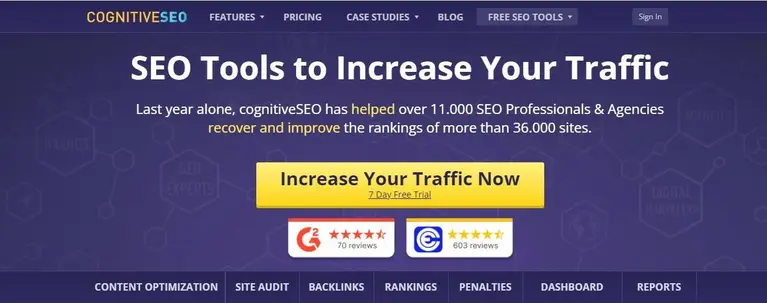
You can use this SEO service platform for local rank checker tools, SEO reporting, keyword research, etc. The automated weekly reporting feature further helps you scrutinize your local SEO performance.
6. Whitespark
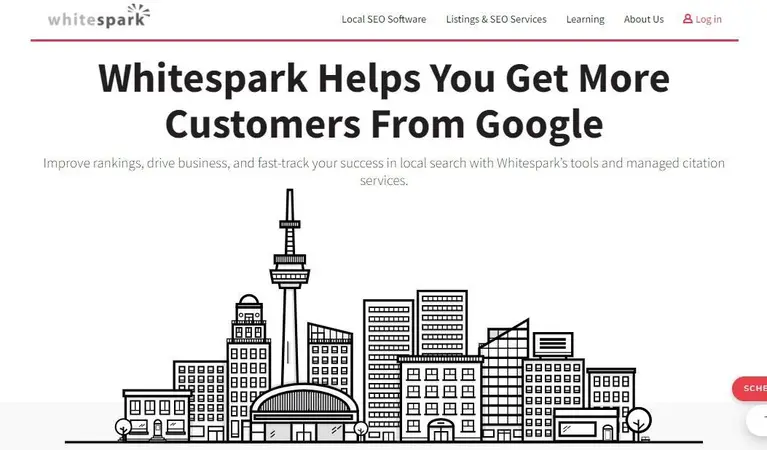
It has been a trusted local marketing platform and offers an intuitive Local Rank Tracker tool. You can generate comprehensive ranking reports on search engines, Google Maps, local 3-pack, and listings.
7. AccuRanker

This SERP tracking tool helps you analyze your ranks based on state, city, landmark, etc. Moreover, you enjoy several popular SERP features and add Google Data Studio for rank reports.
8. Tribe Local

Tribe Local is a one-stop local SEO platform. You can check your online reputation, listings, rankings, Tribe Local's local SEO score, etc. It is integrated with Google Analytics and delivers scheduled reports.
Importance of Tracking Your Google Maps Ranking
1. Reaching a Relevant Audience through Google Maps Searches
Google Maps appeals to over 154.4 million users per month. And it powers over 20 million local-intent searches every day.
That said, if you rank on Google Maps, you will most likely reach a substantial part of your ideal audience because the audience looks for brick-and-mortar businesses on maps to find the nearest ones, as an example in the below image.

Many consumers will likely visit your store the same day after checking your profile on Google Maps. Moreover, you can expect increased website visits and direct inquiries through better Google Maps visibility.
You must track your Google Maps rankings for your crucial business-specific queries. And you must also check the ranking keywords. You can further check which competitors dominate the Google Maps search results for highly-relevant queries.
Next, you must put these insights to use and optimize for the relevant queries and keywords. You can regularly reassess the change in your rankings.
Read: Get to Know 15 Incredible Features of Google Maps
2. Checking the Inadequacies in GMB Optimization
Your Google My Business profile quality remains one of the most significant factors defining your Google Maps rankings.
That also means that your Google Maps rankings reflect the optimization of your GMB profile.
So, if you fail to rank for highly relevant keywords, you may need to work on your GMB profile.
Some of the possible optimizations include:
- Ensure you add a consistent address, business name, and contact info. It must not vary on your site, GMB, or other business listings. In the below screenshot, a business has missed the proper address. It will hurt them in the long run.

- Grow engagement on your GMB profile by adding images of the venue, products, menu, specialties, etc.
- Include relevant search terms in your GMB description, and chime in the long-tail queries in FAQs. These efforts increase your profile relevancy.
- Gain abounding user reviews on your profile and create offer or event posts to boost engagement.
3. Google Maps Results are almost equivalent to Local 3-Pack Results
46% of the total searches on Google have a local search intent. As Google approximately serves 5.6 billion daily searches, 2.6 billion are local searches.
And the Local 3-pack shows up for over 93% of these searches.
The below screenshot shows a search result that ranks businesses on local 3-pack and Google maps.

When you optimize for the Google Maps rankings, you automatically grow your probability for the Local 3-pack.
Moreover, Local 3-pack results source their preview data from the Google My Business listings.
Some tips that help you optimize for Google Maps Searches and Local 3-Pack results include:
- Grow relevancy and engagement on your GMB profile
- List all your service areas or multiple outlet locations in the GMB to enhance the proximity factor
- Keep the GMB reviews at the center of your feedback requests
- Optimize your site content for localization, relevancy, and authority
- Enhance the site's mobile compatibility, responsiveness, and performance
4. Tracking a Soft GMB Account Suspension In Time
Tracking your Google Maps rankings unveils any possible profile suspension activities by Google.
So, if you witness a sudden drop in your Google Maps rankings, it is probably due to profile suspension. Or, if you cannot find your business listing in Google Maps searches, it is a suspension.
The below screenshot shows an example of a suspended business account.
Here are the possible reasons why Google may suspend your GMB profile:
- You changed your location or business name, but you didn't update the same on GMB
- You have stuffed your profile with unnatural keywords
- You are deceiving Google by creating multiple profiles for one single business.
- You aren't consistent with your brand name or address across several listings
- You have set site URL forwarding or phone forwarding
- You own a 'service area business', but your profile displays a physical address
Check for these reasons, fix the error, and submit a reinstatement to Google.
5. Scrutinizing and Optimizing the Local SEO Strategy
Several Google Maps rank tracking tools give you access to an extensive list of local SEO metrics.
Some popular tools are WebCEO, GeoRanker, BrightLocal, etc.
The below screenshot shows an overview of crucial data provided by these tools.

Along with the Google Maps ranking, these tools offer metrics like:
- Local search rankings;
- Best performing keywords;
- The total traffic, inquiries, and acquisitions;
- Ranking competitors, their keyword strategy, and citation opportunities;
- Local citations and positions in popular listings (Yelp, Foursquare, etc.);
- Site SEO performance and user-metrics
These metrics and insights allow you to scrutinize your overall local SEO strategy. Competitor analysis and citation opportunities further help you grow your SEO value.
Google Maps Ranking Factors
1. Google Maps Business Listing
The first and foremost factor is a verified presence on Google My Business Listing.
- Start with checking your business presence on Google Maps. Open the Google Maps app and search for your official business name.
- If you find your business listing (alongside your location) on Google Maps, you just have to claim and optimize your listing.
Here is a difference between 'Unclaimed' and 'Claimed' listing:

- Meanwhile, if you do not find your business and see a message like "add a missing place," you need to create a new listing.
Here is how you can claim or create a verified listing for your business on Google Maps:
- Open the Google My Business gateway and start by clicking "Manage Now."
- Use your official Google Account (You can create and manage one from here.)

- Next, search your business name, and you can find your business listing. You can then claim the business as an owner by clicking on "Request Access." Next, you need to optimize each listing element (check the next section).
But, if you are here to create a new Google Maps listing, you can opt for the 'Create a profile option.

- Add your registered business name and business category for the new business listing.
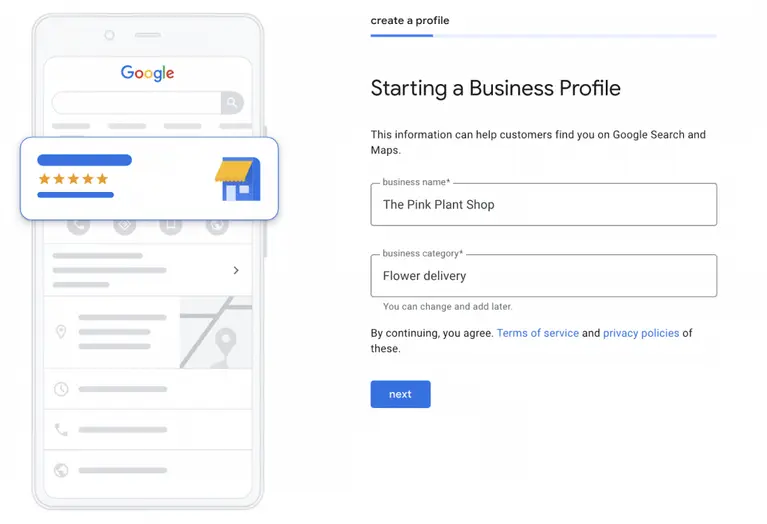
- Then, mention your business location (Google verifies the same).
If you are a service provider for specific local areas, choose 'No' for this question:
Note* In an upcoming section below, we will discuss 'how to add local service areas' for service businesses.

- Next, complete your listing by adding other elements like contact details, business hours, services, images, etc.
- When the details are added, you can request a Postcard Verification. You may also get Email and Phone Call Verification options for some businesses.
Read: Step-by-step Setup Guide for Google My Business Set up
2. GMB Signals
GMB signals remain the most prominent ranking factor for Google Maps search results.
Moreover, your GMB listing shows your expanded business profile in Google Map search results.
So, here are ways to optimize the main elements of your GMB profile:
- Consistent NAP: Grow your business credibility with consistent business name, phone number, and location details on GMB.
- Category: Choose your specific business category and grow relevancy by adding secondary categories. You must also scrutinize the secondary categories mentioned by your competitors.
- Services/Products: Mention your main product or service offerings with details and pricing.
- Description: Create a 150-200 word description to highlight your brand USPs and capabilities. Further, showcase your specialties and expertise. Also, chime in your location and business-specific keywords naturally in this description.
- Service Area Business: If you do not serve at a particular store location, you must mark yourself as a 'service area business'. Next, add all your specific service areas on Google Maps.
- Hours: Mention your Business Hours or Service Hours (for the entire week). Your customers can refer to these before visiting or connecting with you.
- GMB Reviews: Your Google reviews hold significance in your Google Map rankings. Enhance your feedback generation strategy for gaining more positive reviews on GMB.
- Images: Images exude trust and win high user engagement. It's okay to populate your profile with relevant images of your products, venue, ambiance, food menu, etc.
- Posts: Grow user engagement and profile visibility by creating several posts. These include offers, CTAs, event posting, new product launches, etc.
- FAQs: Address popular long-tail queries as FAQs in your GMB profile. It will grow your profile's relevancy for relevant local queries.
3. Google Reviews
82% of consumers prefer visiting a local business only after researching its reviews. Moreover, GMB reviews uphold significant importance for local businesses online.
Businesses with abundant local reviews and a strong positive sentiment are highly likely to rank higher in Google Map searches.
Therefore, you must revisit your review generation strategies to win bountiful positive reviews.
Add these tips to your review generation strategy:
- Earn reviews from your in-store customers by adding your GMB review link to your feedback forms. You can simply create a barcode that directs to your GMB profile and add it to your feedback form. Ensure to pass these feedback forms to your happy customers.
- GetFeedback and SurveyMonkey are useful platforms to automate feedback generation requests.
- Link your GMB profile to your review generation requests via email or web notifications.
- Attach incentives with your review requests ("E.g., Post a review about your experience at our salon and expect a 10% discount on your next visit").
- Be prompt at responding to both positive and negative reviews. 89% of consumers appreciate a brand's reply to user reviews.
- Address repeat visitors on your site with gentle feedback reminders.
- Connect with niche bloggers or influencers and request them add a review for your business.
4. Proximity, Personalization, and Behavioural Factors
Google Maps rankings lay substantial emphasis on proximity and localization factors.
Proximity Factor
a) Service Area Business
To own a 'service area business', you must highlight all your main service locations (area, town, state). This approach helps you rank in Google Maps for queries relevant to these locations.
Here is how you add your service locations:
- Head over to the GMB dashboard
- Click on the "Info" tab and start editing the 'Address' field.

- Here click on "Clear address" to remove your physical location
- Next, use the option to add service areas (area, town, state)
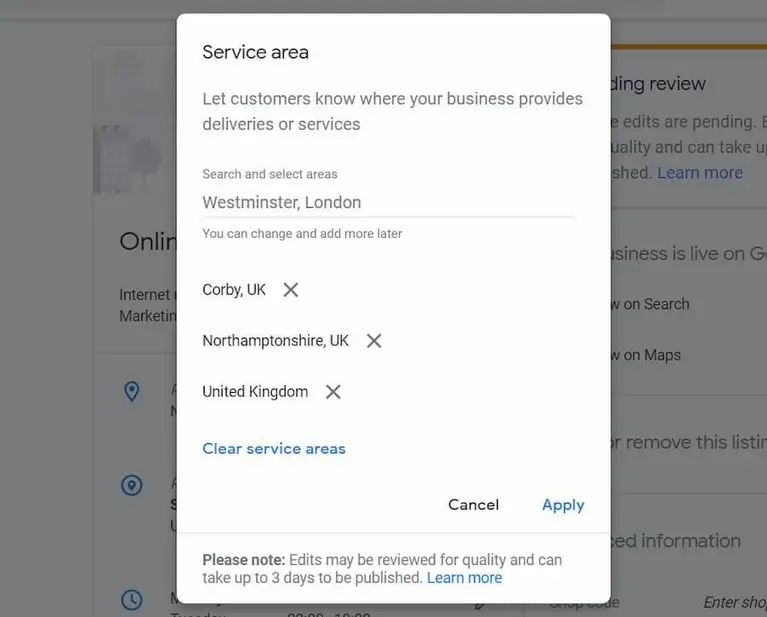
- Save and submit these changes and request verification.
b) Multiple Outlets
Further, if you have multiple outlets for multiple locations, you must add them to GMB. This helps them to optimize for the 'Proximity factor'.
Open your GMB account and use the "Add a business" tab to add more locations, as shown below:
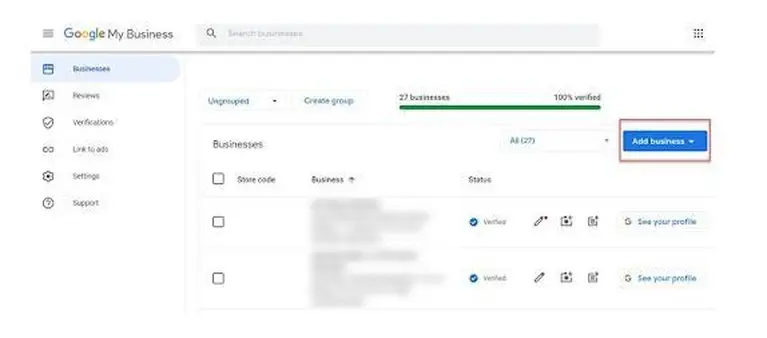
Next, choose "Add single business" for adding a single business or "Import businesses" for multiple outlets.
Add your outlet's location and request the PostCard Verification.
Localization Factor
Also, optimize for the localization factor by:
- Integrate Google Maps on your site
- Add location-specific keywords, local currency, and local dialect to your site
- Make your phone number clickable for the mobile users
5. On-page Optimization Signals
The on-page optimization signals significantly impact your location authority. And thus, your Google Maps rankings vary based on your on-page SEO signals.
Here are tips to strengthen your on-page SEO signals:
- Use competitive analysis (SEMRush, Ubersuggest) to find your competitors' location-specific keywords. Also, refer to Google Keyword Planner, and add sorted keywords to the main site pages.
- Submit your updated sitemap through Google Search Console and add location Schema.
- Create intriguing Meta Titles and Meta Descriptions for indexed pages. And introduce the focus keywords in these tags.
- Use your Google Search Console and Google Analytics accounts to scrutinize and optimize your SEO performance.
- Assess your webpage performance and errors on PageSpeed Insights. Next, fix the site speed errors with your developer's assistance.
Minify the HTML and JS files, compress the images and load the JS asynchronously.
- Next, over 60% of local search traffic comes from mobile devices. And so, use Google's Mobile-friendly Test tool to scrutinize your site's responsiveness and fix the same.
Key Takeaways
Here are tips to win high visibility in Google Maps search results:
- Build and claim your business listing on Google Maps.
- Add consistent and credible details to your GMB profile.
- Map business and location-specific keywords in the GMP profile and site content
- Specify all your service locations or multiple outlet locations in GMB to enhance the proximity
- Beautify your GMB profile by posting offers, CTAs, and images
- Accelerate your review generation processes for more positive GMB reviews.
- Improve site localization with location-specific keywords, the local language, currency, etc.
- Optimize meta tags and add location schemas and sitemap
- Enhance the site's mobile compatibility and make fixes for your site to load faster
ABOUT THE AUTHOR:
Brice Decker

Brice has been handling marketing projects for more than 12 years and he is providing consulting services on SEO, Social Media and PPC. He has a huge expertise in working at large corporations including Accenture Interactive & PwC Digital Services.
ABOUT THE AUTHOR:
Brice Decker

Brice has been handling marketing projects for more than 12 years and he is providing consulting services on SEO, Social Media and PPC. He has a huge expertise in working at large corporations including Accenture Interactive & PwC Digital Services.
Related Post
How to Rebrand Your Business Without Losing SEO?